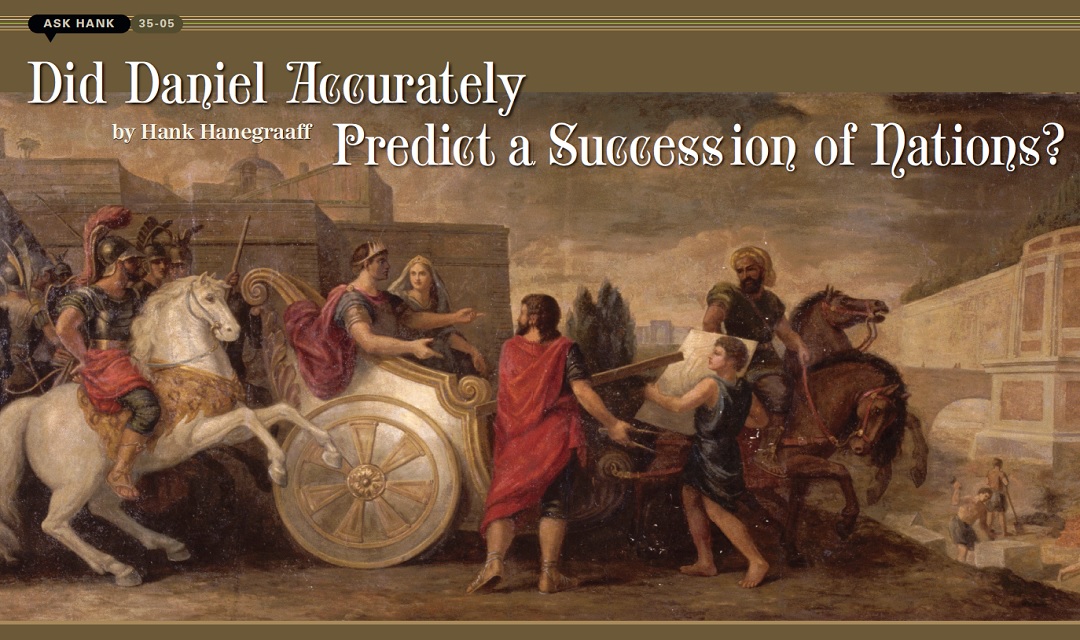This article first appeared in the CHRISTIAN RESEARCH JOURNAL, volume 35, number 05 (2012). The full text of this article in PDF format can be obtained by clicking here. For further information about to the CHRISTIAN RESEARCH JOURNAL, click here.
SYNOPSIS
One of the most significant demonstrations that the Bible is divine rather than merely human in origin is the undeniable reality that the prophet Daniel, writing six centuries before the advent of Christ, was empowered by Almighty God to do what no soothsayer or astrologer could. With awe-inspiring precision, he predicted a succession of nations from Babylon through the Median and Persian Empires, to the “terrifying and frightening and very powerful” kingdom of Greece, which “crushed and devoured its victims and trampled underfoot whatever was left” (Dan. 7:7). Daniel foresaw the mighty Alexander the Great suddenly burst into history, traverse “the whole earth without touching the ground” (8:5), shatter Medo-Persia, and leave a horrific legacy that culminated in the persecution and suffering of the Jews under the second-century Greco-Syrian beast Antiochus IV Epiphanes, including the despot’s desecration of the Jerusalem temple, his untimely death, and freedom for the Jews under Judas Maccabaeus. Moreover, as Daniel looked down the corridor of time, he got a glimpse of a kingdom that will itself endure forever. Truly, the succession of nations immortalized by the book of Daniel is a surpassingly spectacular star in the constellation of biblical prophecy.
During the century following the death of King Solomon, a divided nation—Israel to the north and Judah to the south—grew indifferent to God’s prophets and precepts. Intended to be a light to the nations, they became a mere microcosm of pagan culture. The kings of Israel made unholy alliances with pagan nations from Egypt to Babylon. They adopted the religions of foreign lands and built altars and shrines to pagan gods. Thus, as God had forewarned them,1 the land vomited out the Israelites as it had the Canaanites before them. The Northern Kingdom was exiled in Assyria (722 BC) and the Southern Kingdom was exiled in Babylon (606 BC).
God, however, was far from finished with His covenant people. Through the prophet Daniel in Babylon, He revealed his present and eternal purposes for the world. As such, six centuries before the advent of Christ,2 Daniel was empowered by the Almighty to do what no soothsayer or astrologer could do. With breathtaking precision, he predicted a succession of nations from Babylon to the coming of the Babe of Bethlehem—a king who would usher in a kingdom that will never be vanquished or destroyed (see Dan. 2 and 7).
FROM BABYLON TO THE MEDES
Daniel begins his prophetic foretelling of the succession of nations by predicting that Babylon—who had broken down the wall of Jerusalem and carried off her treasures, had burned the temple and destroyed the royal palaces, and had carried the remnant of Israel into exile and servitude—would itself fall from its lofty perch as golden head of the nations. Nebuchadnezzar had expunged the glories of the Assyrian Empire and made Babylon supreme in splendor and strength. “You, O king,” said Daniel, “have become great and strong; your greatness has grown until it reaches the sky, and your dominance extends to the distant parts of the earth” (Dan. 4:223). During a reign of over forty years, Nebuchadnezzar was without equal in all the Earth. His insufferable arrogance is seen not only in the height and breadth of the most prodigious walls ever built around an ancient city (cf. 4:30),4 but in the golden statue he erected to himself on the plain of Dura in the province of Babylon (3:1).
However, following Nebuchadnezzar (605–562 BC) the glories of Babylon faded with mindboggling rapidity. Evil-Merodach, who succeeded Nebuchadnezzar, ruled but two years before being assassinated, and Neriglissar, his brother-in-law, but three. Neriglissar’s youngest son was murdered in June of 556 BC after only two months as monarch of the rapidly declining empire. Nabonidus—who may well have suffered the same maladies that drove his father-in-law Nebuchadnezzar to a seven-year stint of mental madness—served as coregent with the insufferable Belshazzar, who on that fateful night (October, 539 BC) gave orders to bring in the gold and silver goblets that Nebuchadnezzar had taken from the temple of God in Jerusalem so that he and his nobles, his wives, and his concubines might drink from them as they praised the gods of gold and silver, of bronze, iron, wood, and stone (Dan. 5:2). “That very night Belshazzar, king of the Babylonians, was slain, and Darius the Mede took over the kingdom, at the age of sixty-two” (5:30–31).
With Nebuchadnezzar dead and Babylon in disarray, the most improbable of Daniel’s prophecies became reality. Media—as inferior as silver is to gold—became dominant in the ancient world.5 And with the ascendancy of the Medes, the prophetic words of Daniel, like those of the prophets before him, began to take on ominous and foreboding reality: “The LORD has stirred up the kings of the Medes, because his purpose is to destroy Babylon” (Jer. 51:11; cf. vv. 28–29; Isa. 13:17–18; 21:2, 9; see Dan. 2:36–39; 7:4–5).6
FROM THE MEDES TO THE MEDO-PERSIANS
The Median star would light the eastern sky for but the briefest of times. Following the death of Nebuchadnezzar, Media—envisioned by Daniel as a beast that looked like a bear raised up on one of its sides with three ribs in its mouth (Ararat, Minni, and Ashkenaz [Jer. 51:27–29])7—was instructed, “Get up and eat your fill of flesh!” (Dan. 7:5). Media’s military expansion into such Babylonian territories as the city of Susa in the province of Elam, however, was short-lived. Twelve years after the ascendancy of the Median Empire, the mighty Astyages (whose sister Amytis was the queen for whom Nebuchadnezzar constructed Babylon’s famed hanging gardens) was deposed by Cyrus the Great, who succeeded in uniting the Median and Persian Empires under a ramrod shield of bronze. Thus, while the Median Empire would have its “fill of flesh,” in the end Babylon would not fall to the Medes but to unified Medo-Persian forces.
If Cyrus was anything, he was pragmatic. Through marrying the daughter of Astyages, he moved into a position of power in Persia as vassal of the mighty Medians and within a decade became their monarch. Upon unifying the Medes and the Persians, he moved swiftly against Lydia’s8 decadent Croesus and then fixed his gaze on the ultimate prize. As Belshazzar drank wine from Jerusalem’s gold and silver goblets, Cyrus diverted the Euphrates and stole into Babylon. Belshazzar was slain and citizens of a golden empire now in disarray embraced him as liberator. Thus, two decades after becoming king of Persia, Cyrus had not only conquered the Medes, Lydians, and Babylonians but led the Medo-Persians to dominance in the ancient world.
From the standpoint of fulfilled prophecy, Cyrus is a veritable superstar. To begin with, he was the embodiment of a kingdom of bronze that would “rule over the whole earth” (Dan. 2:39). In biblical vernacular bronze was symbolic of strength and beauty. Even as I write I am reminded of Zechariah, who portrayed the immovable dwelling place of God as “mountains of bronze” (Zech. 6:1); Micah, who prophesied that the daughters of Zion would be given “hoofs of bronze” with which to break to pieces many nations (Mic. 4:13); Ezekiel, who envisioned an angel “whose appearance was like bronze” (Ezek. 40:3); and Jesus, whose feet are like burnished bronze (Rev. 2:18).
The strength of Medo-Persia was surpassed only by its size. After unifying the Median and Persian Empires, Cyrus conquered the Lydian Empire along with Sardes, “the richest city of Asia after Babylon.”9 His “defeat of Babylon and the Babylonian empire, along with his previous conquests, brought the whole of the Near East within the Persian Empire with the exception of Egypt.”10 Though immodest, the Cyrus Cylinder aptly sums up the extent of his rule: “I am Cyrus, king of the world, great king, powerful king, king of Babylon, king of the country of Sumer and Akkad, king of the four corners of the earth.”11
Though Cyrus died a scant nine years after overwhelming the glory of the Chaldeans, three successors would significantly add to the size and scope of Persian power. Cambyses extended the empire through annexation of Egypt. Darius I added northern India, Thrace, Macedon, and northeastern Greece. And Xerxes ruled the earth in legendary opulence. Thus the prophecy of Daniel was fulfilled: “Three more kings will appear in Persia, and then a fourth, who will be richer than all the others” (Dan. 11:2; cf. 7:6). In all, they would succeed in creating the largest empire the world had ever known (2:39)—an empire that would not be surpassed until Rome had reached its zenith.12
Furthermore, though he created an empire that would “rule over the whole earth,” the ultimate prophetic significance of Cyrus was realized in his liberation of the Jews from exile in Babylon. As such, Isaiah did what prophetic imitators could not—in the eighth century BC he prophetically named Cyrus long before his birth in the sixth century: “This is what the LORD says…of Cyrus, ‘He is my shepherd and will accomplish all that I please; he will say of Jerusalem, “Let it be rebuilt,” and of the temple, “Let its foundations be laid.”’ This is what the LORD says to his anointed, to Cyrus, whose right hand I take hold of to subdue nations before him and to strip kings of their armor, to open doors before him so that gates will not be shut” (Isa. 44:24, 28–5:1).
Cyrus, like Nebuchadnezzar before him, was deeply impacted by the reality that the Most High God knew precisely what would happen in future times. Upon the realization that he had been called by name long before he was formed in his mother’s womb and commissioned to be the agent by which the Holy Temple would be reestablished in Jerusalem, Cyrus made the following proclamation throughout all of Asia: “Since the Most High God has appointed me king of the habitable world, I am convinced that He is the God whom the Israelites worship. He foretold my name through the prophets, and that I was to build his temple in Jerusalem.’”13 As elucidated by Josephus, “Cyrus knew this from reading Isaiah’s prophecies given 210 years earlier. He marveled at the divine power, and he was controlled by desire to fulfill what was written. Gathering the most distinguished Jews in Babylon, Cyrus told them that he would permit them to return to their native land and rebuild Jerusalem and their temple. He would be their ally and would write his satraps and governors near Judea to contribute gold and silver for the building of the temple.”14
Finally, we should note that it was the edict of Cyrus that fulfilled the prophetic words of Jeremiah: “When seventy years are completed for Babylon, I will come to you and fulfill my gracious promise to bring you back to this place” (Jer. 29:10). Thus, it was that “Daniel understood from the Scriptures, according to the word of the LORD, given to Jeremiah the prophet, that the desolation of Jerusalem would last seventy years” (Dan. 9:2). Again the words of eminent historian Josephus are enlightening: “In the first year of Cyrus’ reign, which was the seventieth year since the Jewish migration to Babylon, God took pity on the captive people. Jeremiah the prophet had predicted that after they had been held in bondage 70 years they would again be restored to the land of their fathers and rebuild the temple.”15
Particularly noteworthy about Jeremiah’s prophecy is the time meted out for Babylonian rule. “When seventy years are completed for Babylon,” said Jeremiah, “I will come to you and fulfill my gracious promise to bring you back to this place” (Jer. 29:10 emphasis added). The particular precision of the prophet here is awe-inspiring. Had Belshazzar been paying attention he might have thought twice about his defiance of the living God by drinking wine from the gold and silver goblets that Nebuchadnezzar had taken from the temple in Jerusalem. For that very night—seventy years after Babylon had conquered Assyria (609 BC)—Belshazzar was slain and Cyrus turned over rule of Babylon to Darius the Mede (539 BC; Dan. 5:30).
As with prophecies concerning Cyrus, the precision of Daniel’s prophetic and historical renderings should not be passed over lightly. First, it should be noted that in contrast to the Median Empire, which is characterized as “inferior,” the Medo-Persian Empire is rightly referred to as a vast empire that would “rule over the whole earth” (Dan. 2:39). Furthermore, prior to unification, Media and Persia are identified separately—the former as a bear, the latter as a leopard (Dan. 7). However, “in the third year of Belshazzar” (550 BC), the symbolism is aptly altered in order to depict the unified Medo-Persian Empire as a singularity. As such, Daniel sees one “ram with two horns standing before the Ulai Canal and the horns were very long. One of the horns was longer than the other but grew up later” (8:3). The horns are identified by Gabriel as Media and Persia—the former as an independent Median Empire and the latter—which grew up later and longer—as the dominant Persian Empire. Finally, it is instructive to note that in seeing the vision of the ram, Daniel was transported to “the citadel of Susa in the province of Elam” (8:2) so that “here in the future royal citadel of the Persian kingdom he might witness the destruction of this world power, as Ezekiel was removed to Jerusalem that he might there see the judgment of its destruction.”16
FROM THE MEDO-PERSIANS TO THE GREEKS
From the citadel of Susa in the province of Elam—the very birthplace of Cyrus the Great—God showed Daniel what would happen three centuries hence as the Medo-Persian Empire was shattered by Grecian hordes. “Suddenly,” writes Daniel, “a goat with a prominent horn between his eyes came from the west, crossing the whole earth without touching the ground. He came toward the two-horned ram I had seen standing beside the canal and charged at him in great rage. I saw him attack the ram furiously, striking the ram and shattering his two horns. The ram was powerless to stand against him; the goat knocked him to the ground and trampled on him, and none could rescue the ram from its power” (Dan. 8:5–7). Lest we mistake the meaning of the vision, the angel Gabriel provides Daniel with 20/20 clarity. “The two-horned ram that you saw,” says Gabriel, “represents the kings of Media and Persia. The shaggy goat is the kingdom of Greece, and the large horn between his eyes is the first king” (8:21).
This king, of course, is none other than Alexander the Great, son of Philip II of Macedon and the Epirote princess Olympias.17 Philip, infamous for spurning Olympias for the younger Cleopatra, exacted vengeance on the Persians for burning Greek temples during the reign of Xerxes, but it was his son Alexander who would ultimately conquer the prodigious Persian Empire.18 Astride the mighty black Bucephalus, its massive brow adorned by a glistening white star, Alexander sent tremors of terror down the spines of the Medo-Persian military. Following the assassination of his father and against all odds, Alexander defeated the mighty Persian armies at Granicus in May of 334 BC. A year later he changed the course of Western civilization at the battle of Issus. Outnumbered six to one, he set his sights on conquering a kingdom as large as his ambition. Leading from the front, the military genius overwhelmed the Persians at Issus (333 BC). When Darius III offered him the entirety of the Persian Empire west of the Euphrates in return for peace, he merely responded in bloody pursuit. Alexander defeated Darius at Gaugamela and there in concert with the prophecies of Daniel became supreme monarch of the ancient world (see Dan. 2:40; 7:7; 8:5–7; 11:3).
Scarcely a decade later, however, in 323 BC, Alexander the Great would die a mortal’s death—one month short of his thirty-third birthday. Yet even in death Alexander set the stage for the fulfillment of prophecy. After accomplishing one of the most extraordinary feats in the annals of military warfare in the destruction of Tyre—itself a remarkable fulfillment of prophecy (Ezek. 26)19—Alexander turned his attention to the Jewish state. He demanded that the high priest forsake his allegiance to Darius the Great. The high priest refused. Thus, Alexander set his sights on Jerusalem. “When Jaddua, the high priest, heard that Alexander was coming, he was terrified, and ordered his people to join him in sacrifice and prayer to God. Appearing to him in a dream, God told him to take courage and decorate the city with wreaths. The people were to clothe themselves in white and the priests with the robes of their order. Then they were to march out of the gates to meet the Macedonians, for they would not be harmed.”20 When Alexander saw the priestly procession advancing toward him he did the unthinkable. He prostrated himself before Jaddua. “His officers wondered if he had suddenly become insane. One of them, Parmenio, went up to Alexander and asked him to explain. He replied, ‘When I was at Dium in Macedonia, considering how I could become master of Asia, I saw this very person in my sleep, dressed as he is now. He urged me not to delay, but to cross over confidently and take dominion over the Persians.’”21
Much to the delight of the Jews, Alexander proceeded into Jerusalem and offered up sacrifices in the Jewish temple. “And when the book of Daniel was shown to him, which predicted that one of the Greeks would destroy the Persian Empire, he thought himself to be the one so designated. When he offered the Jews whatever they desired, the high priest asked that they might observe their own laws and be exempt from the tribute every seventh year. Alexander granted these requests. They further asked that the Jews in Babylon and Media be allowed their own laws, and he also agreed.”22 So it was that a brittle relationship was forged between the empire of Greece and the elect of God. On one hand, the Hebrew Bible would be translated into Greek. On the other, Hellenism would be embraced by Jewish elite. In the end, however, Hellenism did not mingle any better with Judaism than iron mingles with clay.
As noted, a decade after entering Jerusalem, Alexander was dead. In keeping with Daniel’s prophecy, “At the height of his power his large horn was broken off, and in its place four prominent horns grew up toward the four winds of heaven” (Dan. 8:8). In a moment, in the twinkling of an eye, an empire was “broken up and parceled out toward the four winds of heaven.” The massive empire did not go to Alexander’s descendants but was “uprooted and given to others” (11:4). As prophesied the four horns that emerged—“but not with the same power” (11:4)—symbolized four generals who gained control of the Grecian Empire following the battle of Ipsus: Cassander, the western portion of the empire; Seleucus, the eastern; Lysimachus, the northern; and Ptolemy, the southern. The four fractured domains summarily morphed into two dominant empires—the Ptolemys of Egypt (kings of the south) and the Seleucids of Syria (kings of the north). The border state of Israel sandwiched between north and south was initially controlled by the Ptolemys. Following the battle of Panias (198 BC), however, the “ten-horned” Seleucid Empire (7:7) controlled Israel and became the worst of Jewish nightmares—for out of the ten horns would arise a “horn that looked more imposing than the others and that had eyes and a mouth that spoke boastfully” (7:20).23
This “little horn” with “eyes like the eyes of a man and a mouth that spoke boastfully” (Dan 7:8), was envisioned to be a “stern-faced king, a master of intrigue” (8:23), and “a contemptible person who has not been given the honor of royalty” (11:21). He would grow in power, “speak against the Most High and oppress his saints and try to change the set times and the laws. The saints will be handed over to him for a time, times and half a time” (7:25). He would vent his fury against covenant keepers but “show favor to those who forsake the holy covenant. His armed forces will rise up to desecrate the temple fortress and will abolish the daily sacrifice. Then they will set up an abomination that causes desolation. With flattery he will corrupt those who have violated the covenant, but the people who know their God will firmly resist him” (11:30–32).
As “the large horn” prophesied by Daniel was Alexander the Great, “the little horn” that “grew until it reached the host of the heavens” was Antiochus IV, last of the Seleucid monarchs, king of the north, son of Antiochus the Great, and chief villain of the Greco-Syrian Empire (Dan. 8:10). Daniel describes Antiochus as a beast that would trample its foes underfoot; as a little horn that would grow in power and become the greatest of four kings; and as a master of intrigue who would ruthlessly oppress the saints for a time, times, and a division of time. In superhuman arrogance Antiochus declared himself the incarnation of Zeus, father of the gods. Though he recklessly deemed himself Epiphanes—“the divine majesty”—detractors rightly dubbed him Epimanes—“the deluded madman.”24
In keeping with the words of Daniel, Antiochus IV Epiphanes, opposer of the purposes of God, was “destroyed— but not by human power” (Dan. 8:25). The death of Antiochus marked the manifest power of God over the kingdoms of humankind and signaled the soon coming of “a kingdom that will never be destroyed, nor will it be left to another people. It will crush all those kingdoms and bring them to an end, but it will itself endure forever” (2:44). This is the “rock cut out of the mountain but not by human hands—a rock that broke the iron, the bronze, the clay, the silver and the gold to pieces” (2:45).
THE PROPHETIC SWEEP OF HISTORY
In sum, one of the most significant demonstrations that the Bible is divine rather than merely human in origin is the undeniable reality that Daniel, writing six centuries before the advent of Christ, was empowered by Almighty God to do what no soothsayer or astrologer could. With awe-inspiring precision, he predicted a succession of nations from Babylon through the Median and Persian Empires, to the persecution and suffering of the Jews under the second-century Greco- Syrian beast Antiochus IV Epiphanes, including the despot’s desecration of the Jerusalem temple, his untimely death, and freedom for the Jews under Judas Maccabaeus.25
Moreover, as Daniel looked down the corridor of time, he got a glimpse of the first-century coming of Messiah. As prophesied by Jeremiah, Jerusalem would experience a partial restoration “when seventy years are completed for Babylon” (Jer. 29:10); however, as revealed to Daniel through the angel Gabriel, the return from exile was merely a type of the antitypical freedom that would be experienced through Judas Maccabeus, which itself was typological of ultimate restoration through the Messiah, Jesus. As such, Daniel’s “seventy sevens” (Dan. 9:24–27) encompassed ten Jubilee eras26 and represent the extended exile of the Jews that would end in the fullness of time—the quintessential Jubilee—when the people of God would experience ultimate redemption and restoration, not in a holy city but in the holy Christ, who inaugurated a kingdom that “will itself endure forever” (2:44).
Truly, the succession of nations immortalized by the book of Daniel is a surpassingly spectacular star in the constellation of biblical prophecy.27
Hank Hanegraaff is president of the Christian Research Institute and host of the Bible Answer Man broadcast heard daily throughout the United States and Canada via radio, satellite radio Sirius-XM 131, and the Internet. For a list of stations airing the Bible Answer Man, or to listen online, log on to equip.org. Hank is the author of numerous books including Has God Spoken? Memorable Proofs of the Bible’s Divine Inspiration (Thomas Nelson, 2011), The Creation Answer Book (Thomas Nelson, 2012), and Afterlife (Worthy Publishing, 2013).
NOTES
- Deut. 28–30; Josh. 23:15–16; 1 Kings 9:6–9; 2 Chron. 7:19–22.
- For defense of the sixth-century authorship of the book of Daniel, see Hank Hanegraaff, “Ask Hank: Genuine Prophecy or Just History Written after the Fact?” Christian Research Journal 34, 4 (2011): 62–63.
- All Scripture quotations are from NIV 1984.
- See Alfred J. Hoerth, Archaeology and the Old Testament (Grand Rapids: Baker, 1998), 376–77.
- For discussion concerning the dominance of Media within the Ancient Near East at this time, see Robert J. M. Gurney, God in Control: An Exposition of the Prophecies of Daniel (Worthing, West Sussex, England: H. E. Walter Ltd, 1980, revised 2006), chapter 5 (the 2006 revised version is available online at http://www.biblicalstudies.org.uk/book_god-in- control_gurney.html, last accessed February 14, 2011); and John H. Walton, “The Four Kingdoms of Daniel,” Journal of the Evangelical Theological Society1 (1986): 25–36, http://www.biblicalstudies.org.uk/article_daniel_walton.html, last accessed April 7, 2011.
- In fleshing out my interpretation of Daniel’s prophecies of the succession of four kingdoms (Babylon, Media, Medo-Persia, Greece), I am particularly indebted to Gurney, God in Control. Although I do not agree with Gurney at every point (e.g., the seventy weeks prophecy of Daniel 9:24–27), I am convinced he is on the right track. Likewise, Walton, “The Four Kingdoms of Daniel”; and C. Marvin Pate and Calvin B. Haines, Jr., Doomsday Delusions: What’s Wrong with Predictions about the End of the World? (Downers Grove, IL: InterVarsity Press, 1995), 63–75. I list other reference sources in Hank Hanegraaff, Has God Spoken? Memorable Proofs of the Bible’s Divine Inspiration (Nashville: Thomas Nelson, 2011), 320n6.
- See Gurney, God in Control, chap. 3; and Walton, “The Four Kingdoms of Daniel.”
- Located in the center of the fertile western slope of Asia Minor, several of Lydia’s cities (including Sardis, Thyatira, and Philadelphia) enjoyed considerable commercial success.
- See Delitzsche’s discussion in C. F. Keil and F. Delitzsch, Commentary on the Old Testament in Ten Volumes, vol. 7, Isaiah (Grand Rapids: Eerdmans, 1976), 219 (second volume).
- Cuyler Young, Jr., “Cyrus,” in The Anchor Bible Dictionary, vol. 1, ed. David Noel Freedman (New York: Doubleday, 1992), 1231.
- Quote from the Cyrus cylinder, in Pierre Briant, From Cyrus to Alexander: A History of the Persian Empire, trans. Peter T. Daniels (Winona Lake, IN: Eisenbrauns, 2002), 44.
- Cf. A. R. Millard, “Persia,” in New Bible Dictionary, ed. J. D. Douglas, F. F. Bruce, J. I. Packer, N. Hillyer, D. Guthrie, A. R. Millard, and D. J. Wiseman, 2nd ed. (Wheaton, IL: Tyndale, 1962), 914–916; and F. F. Bruce, New Testament History (New York: Doubleday-Galilee, 1980), 1–19.
- Paul L. Maier, trans. and ed., Josephus: The Essential Works: A Condensation of Jewish Antiquities and The Jewish War (Antiquities 11) (Grand Rapids: Kregel, 1994), 188.
- Ibid.
- Ibid., 187.
- C. F. Keil, Biblical Commentary on the Book of Daniel, in C. F. Keil and F. Delitzsch, Commentary on the Old Testament in Ten Volumes, vol. 9 (Grand Rapids: Eerdmans, 1976), 289.
- Most of the details I convey concerning Alexander the Great are found in Curtius Rufus, The History of Alexander, trans. John Yardley (New York: Penguin, 2001); Peter Green, Alexander of Macedon 356-323 B.C.: A Historical Biography (Berkeley: University of California Press, 1992).
- R. D. Milns, “Alexander the Great,” in The Anchor Bible Dictionary, vol. 1, ed. David Noel Freedman (New York: Doubleday, 1992), 146.
- For discussion of Ezekiel’s complex prophecy against Tyre and its historical fulfillments, see Hanegraaff, Has God Spoken? 122–24.
- Josephus, Antiquities 11:331.
- Ibid.
- Ibid.
- For identification and discussion of the “ten horns” (Dan. 7:7), see Gurney, God in Control, chap. 5.
- Gleason L. Archer, Jr., Daniel, in, Frank E. Gaebelein, gen. ed., The Expositor’s Bible Commentary, vol. 7 (Grand Rapids: Zondervan, 1985), 136.
- The following insights may be instructive to those opting for a succession of nations from Babylon to Medo-Persia to Greece, culminating with the Roman Empire. First, Rome is never explicitly mentioned in the book of Daniel. Instead the empires explicitly dealt with are Babylon, Media, Persia, and Greece. Furthermore, the culmination of Daniel’s concerns—the very thing that caused Daniel’s face to turn pale (7:28), that exhausted him and caused him to become ill (8:27)—were prophecies concerning the Greek kingdom, culminating at “the time of the end” (8:17, 19; 11:35, 40; 12:4, 9) with “the abomination of desolation” (9:27; 11:31; 12:11) exacted upon Israel by the Syrian despot Antiochus IV Epiphanes, the “little horn” (7:8; 8:9). Finally, Daniel is clearly concerned with the succession of kingdoms from a singularly Jewish perspective. Thus he views fulfilled prophecy in much the same way that Jeremiah and Isaiah do. In Jeremiah 51:11 Babylon is overthrown by the Medes, not the Medo-Persians; likewise, in Isaiah 13:17–18 Babylon is overthrown by Medes, not Medo-Persians. Moreover, from the perspective of the book of Daniel, Darius the Mede is the successor of Babylon’s kings—indeed, he is the one who threw Daniel into the lions’ den. Even the great Cyrus was a Mede, while Persians are not spoken of independently of Media. Media is clearly seen within the book of Daniel as a kingdom unto itself that is subsumed by the much greater Persia at a later stage (Dan. 8:3).
- A Jubilee era comprises “seven Sabbaths of years” or “a period of forty-nine years,” followed by the proclamation of “liberty throughout the land” in the fiftieth year—the year of Jubilee (Lev. 25:8, 10).
- This article is adapted from Hanegraaff, Has God Spoken? 114–122, 124–127.










